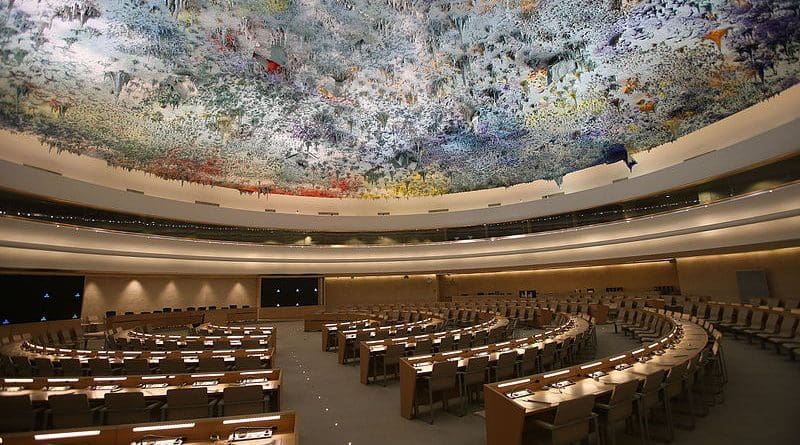Turkish And OIC Condemnation Of India’s Kashmir Stance Sparks Heated Debate At UNHRC – OpEd
The Kashmir problem has once again sparked a heated worldwide discussion. This time, it occurred in Geneva during the 52nd session of the United Nations Human Rights Council (UNHRC). The matter was raised by Turkey and the Organization of Islamic Cooperation (OIC), which made India apprehensive and defensive about their stance.
In response, India criticized the Turkish government and the UNHCR’s high-level segment. The Modi regime even reminded Turkey of the little relief shipment it sent to the earthquake victims and accused Ankara of meddling in India’s internal affairs.
India has overlooked the fact that the Kashmir issue is not just an internal matter but an international dispute that the United Nations has recognized through several resolutions.
India’s history, strategic objectives, and interactions with other nations in the region and around the world have all influenced its foreign policy. The Chanakya philosophy, which stresses the importance of political strategy and cunning, has had a big impact on India’s foreign policy and helped build the country’s reputation as a smart and strategic player on the world stage.
However, recent events have brought India’s foreign policy under scrutiny. Some members of the international community have criticized India’s focus on Pakistan as a potential threat to regional stability because they view it as a limited and potentially fruitless approach to diplomacy. The notion that “a friend of my enemy is my enemy” has been seen as evidence of India’s overly aggressive stance. It has raised concerns about the potential for conflict in the region. The recent Operation Dost in Turkey has raised questions about India’s self-centred mindset and willingness to act unilaterally in pursuit of its interests.
Recent aid in Ooperation Dost at the time of the devastating earthquake was merely on humanitarian bases, but this was the reflection of Chanakya’s philosophy in the pursuit of long-term diplomatic goals. This undemocratic behaviour has revived the famous concept that “there is no such thing as a free lunch”.
India’s foreign policy has often been assertive and sure of itself. The country often reminds the West that it can do what it wants with its foreign policy. In 2015, India’s Minister of External Affairs, Sushma Swaraj, stated, “India is not a follower of any country or power, nor will it ever be. We are free to pursue our foreign policy initiatives as our own choice.”
However, recent events have exposed the limitations of India’s approach. The recent statement by the Organization of Islamic Cooperation (OIC) has demonstrated that India’s claims of isolating Pakistan in international diplomatic circles are farcical. As the OIC noted, “the Indian government’s continued denial of the basic human rights of the Kashmiri people has been met with condemnation from the international community, and India’s attempts to isolate Pakistan have been unsuccessful.” This demonstrates that India’s aggressive stance towards Pakistan has not effectively achieved its desired outcomes.
India’s Foreign Policy: Aggressive Finger-Pointing or Collaborative Diplomacy?
India’s recent game of “who is to blame” with Turkey over the Kashmir issue shows that it is unwilling to respect other countries’ moral positions. India has accused Turkey of betraying it and collaborating with Pakistan. However, this approach risks isolating India further and damaging its reputation on the international stage. As the Indian diplomat, Shashi Tharoor, has noted, “India’s credibility on the world stage depends on its ability to work constructively with other nations, not on its ability to point fingers and lay blame.” Therefore, India may need to adopt a more collaborative and respectful approach to foreign policy if it hopes to achieve its goals in the international arena.
This behavior shown that India’s foreign policy has some worrying tendencies, like being aggressive toward Pakistan and not respecting the principles of other countries. India’s recent accusations against Turkey show that it is more interested in pointing fingers than in making things better. Also, India’s recent comments about how the shipbuilding industry in Turkey helps Pakistan’s terrorist activities have made people worry about how committed it is to democratic norms and how willing it is to use irresponsible language.
The international community has noticed this behaviour. The Organization of Islamic Cooperation (OIC) and other stakeholders have expressed their concerns about India’s approach, and human rights organizations like Human Rights Watch (HRW) have criticized India’s lack of progress in addressing human rights concerns. HRW notes in its recent report that the West’s approach of “quiet diplomacy” has not had a visible impact on India’s behaviour, underscoring the need for a more assertive approach from the international community.
India might need to rethink its foreign policy to deal with these problems and build better relationships with its neighbours and the rest of the world. HRW notes, “It is time for India to recognize that the world is watching and that its actions have consequences.” By taking a more collaborative and respectful approach to foreign policy, India can demonstrate its commitment to democratic norms and human rights and build stronger relationships with its regional partners and beyond.
Abdul Mussawer Safi is an author at various platforms such as Modern Diplomacy, South Asia Journal, Eurasia Review and Kashmir Watch. He is pursuing his bachelor’s in international relations from the National Defense University Islamabad. He has a profound interest in World politics especially, in the regional dynamics of South Asia. His academic strengths are critical and SWOT Analysis. He tweets at @MussawerSafi and can be reached at [email protected]

